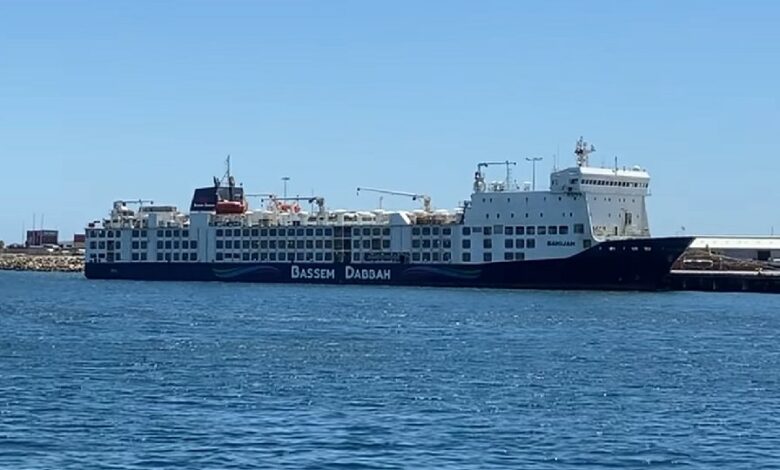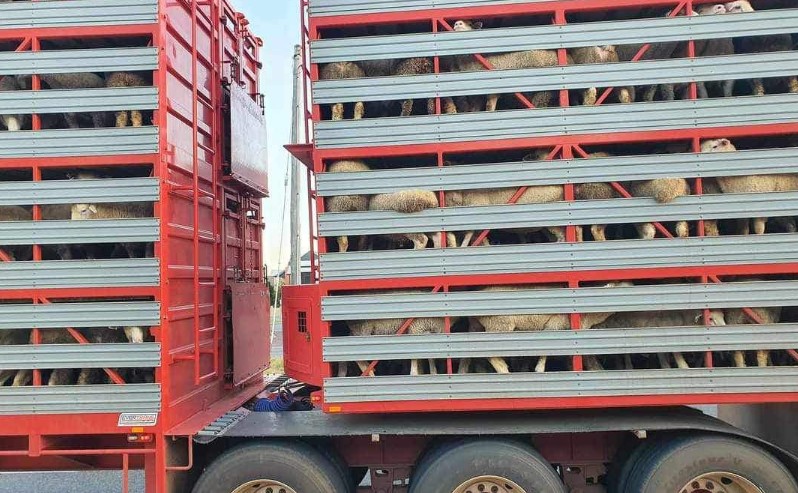Bahijah livestock carrier saga ends after six weeks and 81 animal deaths

After nearly six weeks at sea, the livestock from the Bahijah carrier have been discharged from the vessel and relocated by truck.
Some 16,000 sheep and cattle that were ordered back from the Red Sea due to the possibility of Houthi attacks, were finally unloaded in Freemantle port in Western Australia.
The unloading was supposed to begin over the previous weekend. Geoff Pearson, head of livestock at farm group WAFarmers, said last week that the vessel could not start disembarking the animals any earlier due to another livestock carrier being loaded in Fremantle. According to Australian law, the livestock must be moved into quarantine after disembarking.
Unloading of the livestock started a few days later than it was predicted. Discharging of the animals started on Monday. They were taken by truck from Fremantle Port to “appropriate premises” in Western Australia. According to the most recent update from Australia’s Department of Agriculture, all animals from the livestock carrier have now been discharged.

Since there were several media reports regarding animal deaths, the department stated that a total of 81 animals died since departure from Fremantle on January 5. While on board, four cattle or 0.18% and 64 sheep or 0.45% died while seven cattle and six sheep died on land. The regulator stated that the next steps for the livestock were a commercial decision for the exporter.
The Israeli-based exporter Bassem Dabbah Shipping diverted from its route on January 16. The ship was ordered to immediately return to Australia citing biosecurity risks and the welfare of the livestock. Since the return, the vessel has been stranded off Perth for weeks except when it berthed in port to restock supplies and fodder.
The exporter did submit a plan to re-export the animals without unloading them back to the Middle East via the Cape of Good Hope, a 33-day route around Africa to evade the Houthis. The plan was not approved by the Department of Agriculture as the exporter did not ensure that the arrangements for the transport of the livestock to their final overseas destination were “appropriate to ensure their health and welfare.”
During this period, the livestock vessel Jawan left Australia for the Red Sea port of Aqaba – regardless of the Houthi risks – and is set to arrive there on February 19. The vessel carrying 60,000 animals is currently entering the Gulf of Aden, near the location where Houthis shot a bulk carrier several days ago.

 carrier have been discharged from the vessel and relocated by truck.
carrier have been discharged from the vessel and relocated by truck.
It’s a misleading headline – the saga is far from over for these animals, as we await the federal Department of Agriculture, Fisheries and Forestry (DAFF) decision on Bassem Dabbah’s application to re-export some or all of the unloaded animals on a 33-day+ voyage around the Cape of Good Hope, the west coast of Africa, Gibraltar and the Mediterranean to Haifa, Israel.
Geoff Pearson may well have said last week “that the vessel could not start disembarking the animals any earlier due to another livestock carrier being loaded in Fremantle” but in fact, that vessel – KLLT’s Al Messilah only began loading today, with a forecast maximum of 41 degrees Celsius, and it’s probably wise to take anything he says, with a grain of salt.
The title was directed towards the time spent on the Bahijah – and being finally let out. The problem for the animals, of course, is far from over as re-exporting is always an unfortunate possibility.
“Bahijah livestock carrier saga ends”
Live export iniquity doesn’t, although volumes are steadily decreasing.
This whole trade is just hideous. Putting animals through this sort of nightmarish saga is indefensible. Why could the animals not be slaughtered in Australia and moved in a frozen state to the end destination. Have religious edicts overwhelmed concerns about animal welfare. it is just barbaric and should be eliminated.
Hey Phil, here’s an idea why don’t you build a heap of abattoirs in Australia and find a few crew to process some of these animals for us cockies.
Cheers in advance.😃
Hey Mont, if it’s such a major problem, firstly why is the trade dying out and then why haven’t you set up some abattoirs given you claim there is such a huge demand.
You see Mont, things don’t add up, do they.
Live animal export by sea is now banned in New Zealand!
“Almost two thirds of the 657 000 head of cattle turned-off in WA in 2016/17 (Figure 6) was processed in local abattoirs”
“Sixty five percent of the beef processed in WA is consumed domestically ”
The Australian Government has committed to phasing out live sheep exports from Australia by sea.
It’s the animal rights movement that are behind it not so much the Christian movement or other religious groups. I am a vegetarian for medical reasons
Misleading by previously saying livestock were being taken care of by vets. That’s absolute rubbish. 81 deaths!!!!!!! Talk about a hell hole.
I am an animal lover since I was a kid, but some times we’ve to understand the more value in reality… lucky country…some unfurtunate…HONESTY
People will say what ever is necessary to appease the concerned and the money makers ,the animals welfare is not a concern and never has been,I bet the sharks of dreo never had it so good.Australia should hang its head in shame,I worked in meat works for years and we would never have been able to operate with the meat inspection criteria